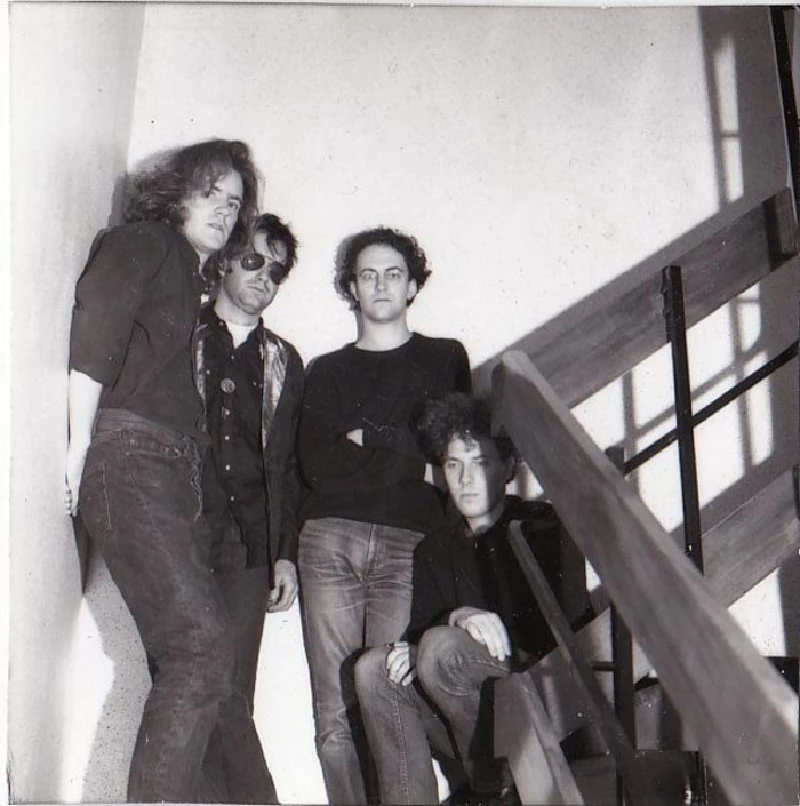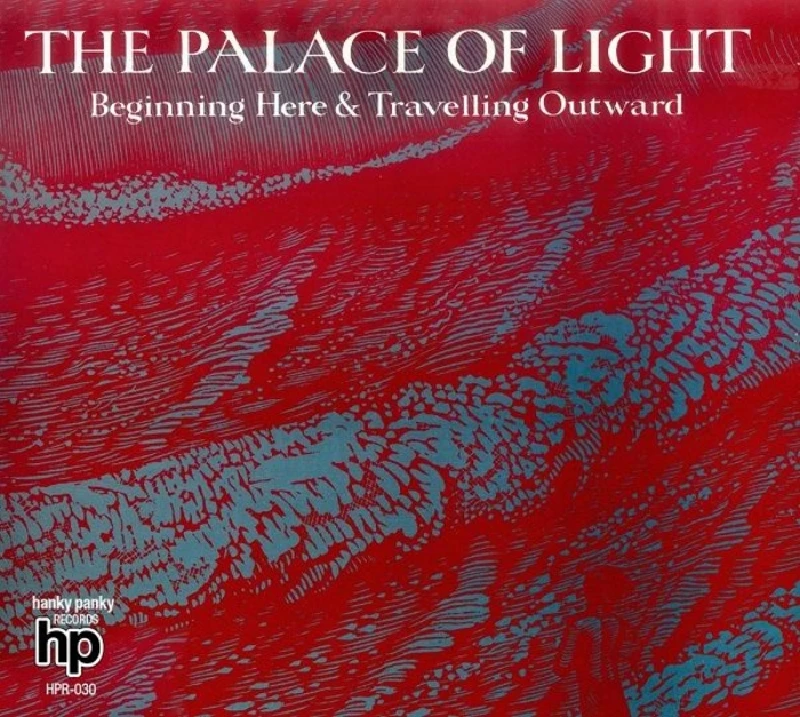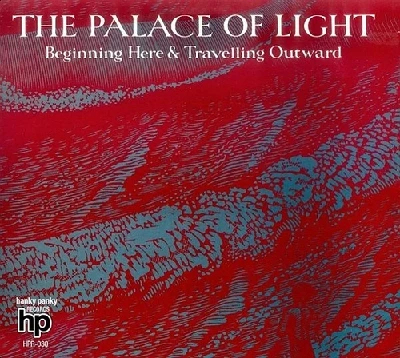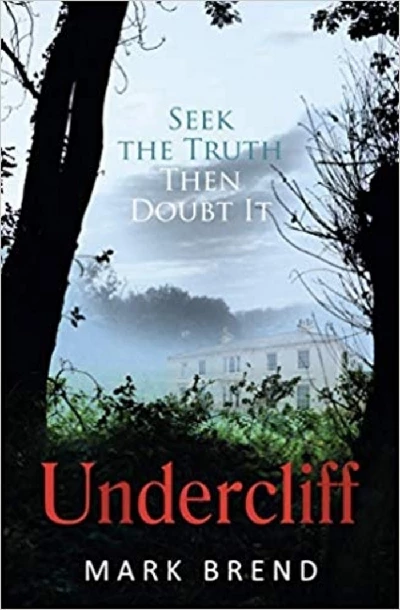Palace of Light - Interview
by John Clarkson
published: 16 / 9 / 2017

intro
John Clarkson speaks to guitarist Mark Brend about his former band folk/psychedelia outfit The Palace of Light, whose 1987 only album ‘Beginning Here & Travelling Outward’ has just been reissued.
“What I am very conscious of is that we worked incredibly hard on it and you can hear that in the record,” says Mark Brend towards the end of an interview with Pennyblackmusic. “It is quite an intense record, and there is a lot of detail in it, and it wasn’t just something that we threw together and chucked out. We put a lot of our lives into it, and I do think that you can hear that.” Brend is on the phone from his home in Devon to talk about his former band the Palace of Light’s 1987 debut album ‘Beginning Here & Travelling Outward’, which has just been re-released in a limited edition of 500 copies by Spanish label Hanky Panky Records. The Palace of Light were a band out of place and out of time amidst the musical bombast of much of the rest of their 1980s, their quiet, stately, complicated songs and singer and guitarist Geoff Smith’s beautiful tenor vocals taking their influence from folk, psychedelia and then unfashionable and long deleted 60’s and early 70’s singer-songwriters such as Nick Drake, Scott Walker and Tim Hardin. The London-based group, which also consisted as well as Smith of Brend (guitars), Matthew Gale (bass guitar, organs) and Charlie Llewelin (drums, percussion), did not put out anything else after ‘Beginning Here & Travelling Outward’. They, however, recorded a lot of until now unreleased material, including a six-song mini-album of cover material by artists such as Drake, Hardin and Mickey Newbury, which has been gathered on the double CD reissue of ‘Beginning Here & Travelling Outward’. The Palace of Light broke up in 1991 when Charlie Llewelin left, its other three members forming a new more country-influenced act Mabel Joy, who like The Palace of Light, remain little known. He stepped back in time thirty years to speak about The Palace of Light. PB: You, Matt and Geoff had played together before in another band Of This Men Shall Know Nothing when you were at Manchester University in the early 1980s. What did they sound like in comparison to The Palace of Light? MB: In Of This Men Shall Know Nothing we had two electric guitars, while in The Palace of Light Geoff tended to play acoustic guitar and I tended to play electric. Of This Men Shall Know Nothing were if anything closer to a band like Television. There were lots of interlocking electric guitar riffs, and we played quite fast. I don't think we have any recordings surviving. We formed in 1981 and we played together until about the spring of 1983. We just played in Manchester. We didn’t play anywhere else, and then Geoff and Matt, who were a year ahead of me, did their finals and left university. There was a year in which we didn’t do anything, and then we teamed up again in the autumn of 1984 by which stage I had also graduated and left Manchester. PB: Did you all move immediately to London? MB: We did eventually but when we first got together and formed The Palace of Light in September 1984 we went to Hemel Hempstead, which is Matt’s home town and we stayed there until Christmas. We didn’t have a drummer at that point. So, we were auditioning drummers and writing songs for those first few months, and then from January 1985 we were based in London. PB: One can hear similarities between acts who were contemporary at the time such as Aztec Camera, the Go-Betweens and the Triffids in your sound, but it seems that you were looking back primarily in your influences to a different age and artists such as Scott Walker, Nick Drake and Tim Hardin for influence. Is that a fair assessment? MB: Yes, we were very aware of contemporary music and liked a lot of Australian acts in particular such as the Triffids, the Go-Betweens, the Saints and Ed Kuepper, but we were keen on Leonard Cohen and also Doll by Doll as well. We also became increasingly aware of the 60’s songwriters, Scott Walker definitely and we also listened to quite a lot of Tim Hardin. We became familiar with David Ackles just as we began recording The Palace of Light album, and were very, very impressed with him, and particularly the first album (‘David Ackles’, 1968) which was a big influence on us. PB: How did you first discover these acts? As Stewart Lee points out in his sleeve notes to ‘Beginning Here & Travelling Outward’ they were not the well-known acts that they are now. They were really pretty obscure. MB: Yes, that is very true. It is hard to think back now to those days in which that music wasn’t readily available, but there was a kind of underground network of connections available. If you liked Leonard Cohen as I did, you might talk to other people and someone might say, “Well, if you like Leonard Cohen, there is this guy on Elektra called David Ackles,” and you might clock the name then. I found the first David Ackles record in a second hand shop for about £2. I also worked in the Record and Tape Exchange in Notting Hill at the time. Most of the people who worked there were older than me and were very, very knowledgeable about that era of music. So when they knew that I had an interest in that era, they recommended a lot of artists to me. A lot of my knowledge came from that and working in that shop. When Phil Smee signed us to Bam Caruso, he was absolutely amazed that we liked David Ackles and Tim Hardin. He in turn introduced us to other artists that we didn’t know before and in particular Mickey Newbury. In fact, I recall that he made a cassette of songs that he thought that we might like to cover by various 60’s songwriters, and Mickey Newbury was on there and Fred Neil and also Cyrus Faryar, whose ‘Bright Island’ we covered which is on the CD. PB: Much of what else was happening at the time involved synthesisers and a lot of remixes. How much of your music do you think was written as a reaction to that and against that? MB: I am not sure that we were consciously reacting to synthesiser music. Certainly there had been a lot of synth pop, some of which we liked and some of which we didn’t like, but I don’t think we reacted to that. We had always been a guitar band. That was our natural starting point. When we were in Of This Men Shall Know Nothin, the bands that we listened to then were the big post-punk band such as Echo & The Bunnymen and Joy Division. They were very much guitar-focused bands, and that was very much our starting point. PB: Was it difficult for you to build up an audience as nobody else was doing what you were doing and you were going against the mainstream? MB: Yes, I don’t think that we really did build up an audience at all. We played live a little bit in London after the album was released. We didn’t play live as The Palace of Light before it was released. We signed to Bam Caruso and we recorded the album. Then when it was released we played a few gigs around London, but we didn’t have an audience really. We got some nice reviews at the time in the music papers, but there was no sense of us having an audience or a following at all. I think that was probably the main reason why it was so hard for us to continue because we were conscious that people weren’t listening that much, PB: Yet you did manage to sell 2,000 copies of ‘Beginning Here & Travelling Outwards’. MB: Times have changed. If you sold 2,000 copies now, then you would be doing pretty well. In those days that was a relatively small number, and we considered the record a commercial failure. I think we sold those copies on the back of reviews. We did get the album well reviewed in ‘NME’ and ‘Sounds’ and ‘Melody Maker’, and tens of thousands of people read those magazines then. PB: You released three tracks on the Psycho label compilation ‘The Waking Dream’ and then after that signed to Bam Caruso. Who were Bam Caruso? MB: Bam Caruso was a label run by Phil Smee, who is a record sleeve designer and has been since the 1970s. He was at a guess about ten years older than us, and he was a hugely comprehensive record collector. He had an extraordinary record collection, and he had in the post-punk era a label in St Albans where he lived called Waldo’s and then eventually it became Bam Caruso. Bam Caruso specialised mainly in 60’s psychedelic reissues. They did a whole series of a compilation albums called ‘Rubble’. ‘Rubble’ was, I guess, the UK equivalent of the ‘Nuggets’ and ‘Pebbles’ series in the US in obscure British psychedelia. He mainly did reissues, but then he decided to sign some current acts. We were one of maybe half a dozen current acts that he signed, but that was quite short-lived as I don’t think any of the acts did particularly well. A guy called Nick Haeffner got quite a lot of attention, but Phil pretty soon went back to doing reissues. PB: ‘Beginning Here & Travelling Outwards’ was recorded over the summer of 1986 at Madhouse Studios in Luton. That must have been quite expensive. MB: Yes, it wasn’t expensive in a Pink Floyd kind of way, but for an indie album it was expensive and Phil was very generous in that respect and we have to thank him for that. He put us up in the studio, and we spent a lot of time there, and got in a string quartet to play on a few songs. Compared to, say, the sort of the recordings so many of the C-86 bands of the time were making it would have been a very costly production. PB: One gets the impression from listening to ‘Beginning Here & Travelling Outwards’ that you had really thought about each note and very carefully about how you were going to create this record. How much of it was rehearsed beforehand and how much of it was created in the studio? MB: It was almost entirely created beforehand. I would say that 99% of the arrangements were thought about in advance. We had a portastudio where we would work out very detailed, intricate demos with all the guitar parts and the keyboard parts, so my memory of that recording process is that after we got down the rhythm tracks we would spend days just going from song to song laying down guitar parts. Geoff, Matt and I were well prepared in advance. We would do one, change the tape reel and do another one. It was very, very well drilled and I think that there was no improvisation at all. PB: Why did it take so long in the studio then? MB: I think that took about thirty days, but I am not certain about that. Part of it was the complexity of the arrangements. ‘City of Gold’, for example, has at least five guitar parts on it as well as bass and drums and organ. It was just the sheer volume of details in the arrangements. We also had a lot of trouble in mixing it, and that certainly took a lot of time at the end of the recording. PB: Was the problem with mixing it simply once again that the music was so complicated? MB: Yes, it was. Brian Marshall, who was the original producer, attempted a mix and we weren’t happy with it, so we then persuaded Phil to let us have a go and we did a mix and it wasn’t that good either. We were at that point stuck, and then Phil decided quite reasonably that that was enough and he wasn’t going to pay any more money at that point. He wanted to put out a combination of the best remixes that we had, but we didn’t want to do that and so we paid Richard Preston to do the final mix which is the one that you hear. I was introduced to Richard by Mike Alway who ran él Records. At the time Richard was the house producer there, and he had also worked with the Go-Betweens. I knew Mike through the Record and Tape Exchange, and Richard came in right at the end and saved the album as far as we were concerned. He really knew what he was doing and we trusted him, whereas before the whole thing seemed out of control. He asked for our opinion, but really the mix was very much his work. PB: You did a lot of recording after ‘Beginning Here & Travelling Outwards’, including as unreleased covers mini-album, but other than the ‘Catherine’/’Books’, which was released as a single under the name of your next band Mabel Joy in 1991, The Palace of Light never actually released anything else? Why was that? MB: We recorded the mini-album of acoustic live covers in the summer of 1987, the summer that the album was released, and Phil Smee was going to release that mini-album as our next release. He paid for the recording, but because we were struggling by that point we briefly split up for six months and the mini-album drifted away. When we got back together again, the first songs that we recorded were ‘Books’, ‘Lost’ and ‘So Simple’. We touted them around several record companies and no one would take them. We did that several more times, recorded several rounds of demos and played a few gigs and circulated them around in the hope of getting a deal, but we never did get a deal. We wanted to make more records. It wasn’t for want of trying but nobody would release them. PB: Why did you change your name to Mabel Joy? Was it just to give yourself a fresh start? MB: It was an attempt at that. We felt that few people had ever heard of The Palace of Light and those who had would have thought, “That was a band that did some obscure album four or five years ago,” so we thought that we would try something fresh. Our style had changed a bit by then. It had become slightly lighter and more country-influenced. Charlie the drummer had left and been replaced by Tom Anthony. It felt like a different band, although there was a continuity between the two. PB: The reissue of ‘Beginning Here & Travelling Outwards’ is concluded with ‘Theory of Everything’, which was recorded in 2016. Is that a new song or one which you have resurrected? MB: It was actually a song that Geoff and I wrote about eight or nine years ago, so it doesn’t date from when The Palace of Light was active. It is a much more recent song. I had a set of words, but didn’t have any music for them. Geoff put music to them, and we recorded a demo for it and worked it up from there. PB: How easy was it to do that as Matt and Geoff are based in London, Charlie is in Texas and you’re in Devon? MB: We didn’t actually get together in a studio at any point. We worked remotely. Geoff recorded acoustic guitar and vocal, I added my bit, Charlie and Matt added their bits, and towards the end Matt and I met a few times, and worked on a mix and some final arrangements. It was very much a 21st century, remote working approach but not at all like the way we used to work. PB: This reissue was planned a long time ago and you were apparently thinking about it as far back as 2003. Why has it taken so long? MB: We have talked about it off and on throughout the years, but Hanky Panky was the first label that came up to us and said, “Okay, we want to do this.” There had been vague interest before, but it never really came to anything. We didn’t fit in with indie music from 1986 and 1987, and so those kind of labels interested in reissuing that kind of material were probably not going to be interested in us. It was always going be hard for us to find a home for us on a reissue label, just as it was going to be hard for us to find a home when we were active in the 1980s. PB: Who are Hanky Panky Records? MB: It is a small label in Spain. They do reissues and also some contemporary stuff, but they are very 60’s and 70’s-influenced. PB: You’re known now as a music biographer and record music under the moniker of Ghostwriter with whom you have released two albums.(‘The Continuing Adventures of the Strange Sound Association', 2010, and ‘Morrow’, with West Country musician Michael Paine, 2014). Are the three other members of the band still active in music? MB: Charlie moved to Texas and he played in the Gourds for a while, a country rock group. Before he joined The Palace of Light he previously had been the drummer in Maximum Joy who reformed last year for a few gigs, so he is still playing. We did one album as Mabel Joy (‘Wish I Was’, 1993) and then Geoff left. Matt and I continued with a new drummer and multi-instrumentalist called Cliff Glanfield, and we did two albums as Fariña, both of which came out on Pickled Egg Records (‘Three People’, 2000, and ‘Allotments’, 2006). Since then Matt has been composing modern classical music. He has written a piece that is just finished, which he is hoping to get recorded and performed called ‘Stations of the Cross’. Geoff still writes songs and plays and has been recording on and off since leaving Mabel Joy, but hasn’t released anything although I hope that he will one day. PB: Thank you.
Picture Gallery:-

reviews |
|
Beginning Here and Travelling Outward (2017) |

|
| Impressive double CD reissue of underrated psychedelic/folk band The Palace of Light’s 1987 sole album |
most viewed articles
current edition
Tossing Seed - InterviewMotorcycle Boy - Interview
Last of the Lovely Days - Interview
Lemonheads - O2 Ritz, Manchester, 16/8/2025
Waterboys - Roundhouse, London, 1/6/2025
Robert Forster - Interview
Cary Baker - Down on the Corner: Adventures in Busking and Street Music
Belouis Some - Video Vault
Brian Wilson - 1942-2025
Morrissey - Photoscapes
previous editions
Flip Side - Raging PagesBob Mould - Brooklyn Bowl, O2 Academy, London, 11/2/2016
Stereogram Revue - Voodoo Rooms, Edinburgh, 2/12.2015
Bill Hicks - Profile
That Petrol Emotion - That Petrol Emotion, Town and Country Club, London, 1988
Dave Greenfield - 1949-2020
Miscellaneous - Minehead, Somerset, 8/5/2009...10/5/2009
John Clarkson - A Life in Music
School - Interview
Ain't That Always The Way - Alan Horne After The Sound of Young Scotland 2
most viewed reviews
current edition
Liarbilitys - VandalheartKirk Adams and Ed Woltil - Eat The Sunshine, Drink The Starshine
Big Flame - Peel Sessions 84-86
Silver Biplanes - Coming Up For Air
Wolf Alice - The Clearing
Suzie Ungerleider - Among The Evergreens
Bruce Dickinson - More Balls to Picasso
Good Charlotte - Motel du Cap
Phew, Erika Kobayashi,, Dieter Moebius - Radium Girls
Rupert Wates - Father to the Man
related articles |
|
Mark Brend: Interview (2019 |

|
| John Clarkson talks to music writer and Palace of Light, Farina and Ghostwriter guitarist Mark Brend about his debut novel 'Undercliff'. |
Pennyblackmusic Regular Contributors
Adrian Janes
Amanda J. Window
Andrew Twambley
Anthony Dhanendran
Benjamin Howarth
Cila Warncke
Daniel Cressey
Darren Aston
Dastardly
Dave Goodwin
Denzil Watson
Dominic B. Simpson
Eoghan Lyng
Fiona Hutchings
Harry Sherriff
Helen Tipping
Jamie Rowland
John Clarkson
Julie Cruickshank
Kimberly Bright
Lisa Torem
Maarten Schiethart